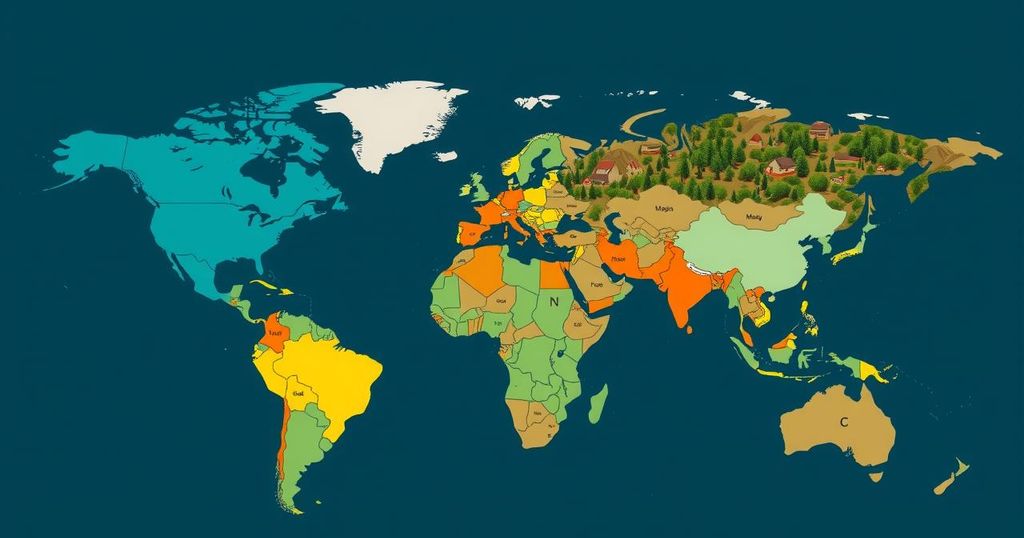In response to Cyclone Freddy’s devastation in Malawi, Christopher Bingala received a $750 payment through a climate change compensation initiative aimed at assisting poorer nations. This funding, part of a broader commitment from wealthier countries totaling $720 million, seeks to address the disproportionately severe effects of climate change on low-income communities. However, experts highlight that the current pledges may not meet the escalating needs arising from increasing climate-related disasters.
In the wake of Cyclone Freddy, which unleashed unprecedented rainfall in Malawi, local farmer Christopher Bingala faced significant loss. The cyclone displaced hundreds of thousands and destroyed homes, leaving individuals without resources to rebuild. A payment of approximately $750 as part of a new climate change compensation initiative, focused on ‘loss and damage,’ enabled Bingala to reconstruct his home and improve his family’s living situation.
This initiative is an outcome of commitments made by wealthier nations to provide financial aid to developing countries suffering the consequences of climate change, despite having contributed minimally to global pollution. So far, countries such as the European Union and the United States have pledged around $720 million. However, experts warn that this amount may be insufficient as climate-related disasters escalate in intensity and frequency.
At COP29 in Baku, Azerbaijan, discussions are ongoing regarding the financial obligations owed to poorer nations within a broader climate financing framework, which also includes loans and investments. Philip Davis, Prime Minister of the Bahamas, emphasized the need for accountability among high-emission nations, stating, “We just hope that the global north and the nations whose economy is fueled by the emissions… take up their responsibility.”
Cyclone Freddy’s impact led to substantial upheaval across multiple nations, resulting in about 650,000 displaced individuals in Malawi. Bingala and his family, after losing their home, were forced into temporary camps, facing dire food shortages and precarious living conditions. However, with the aid received, Bingala managed to create a safer environment for his family, moving to a less flood-prone area. He reflected positively on their new life, expressing relief at the safety and happiness of his children.
The funding Bingala received originated from Scotland, recognized as the first nation to allocate funding specifically for loss and damage initiatives. The distribution of these funds was facilitated by GiveDirectly, a non-profit organization focused on providing unconditional cash grants. This program empowers families by compensating them for losses, enabling them to invest in necessities such as housing, education, and equipment.
Despite these advances, substantial challenges remain. The allocation of the pledged funds is still under discussion, with many low-income countries advocating that the assistance extends beyond immediate disaster recovery. The necessity for comprehensive loss and damage funding is projected to reach an alarming $250 billion annually by 2030, highlighting the urgency of international collaboration to address climate-related financial repercussions. Prime Minister Davis noted the implications of inaction, observing that failing to address rising sea levels may lead to significant humanitarian crises that will affect broader regions beyond those initially afflicted.
As the impacts of climate change intensify, low-income countries are increasingly bearing the burden of disasters such as hurricanes, storms, and droughts. These nations historically contribute the least to greenhouse gas emissions, yet they face disproportionate consequences, exacerbating poverty and instability. The necessity for a dedicated financial mechanism to address “loss and damage” due to climate change has gained traction, leading to international agreements aimed at compensating developing nations. The establishment of this fund is critical for providing relief and facilitating recovery for communities devastated by environmental changes.
The current focus on compensating developing countries for climate change-related losses represents a pivotal step towards addressing global inequity in the face of environmental degradation. As the climate crisis accelerates, innovative funding solutions and international cooperation will be essential to ensure that vulnerable populations can recover and adapt to the challenges posed by climate change. The need for consistent and adequate funding is paramount to avert humanitarian crises and support sustainable development in affected regions.
Original Source: www.wrvo.org






